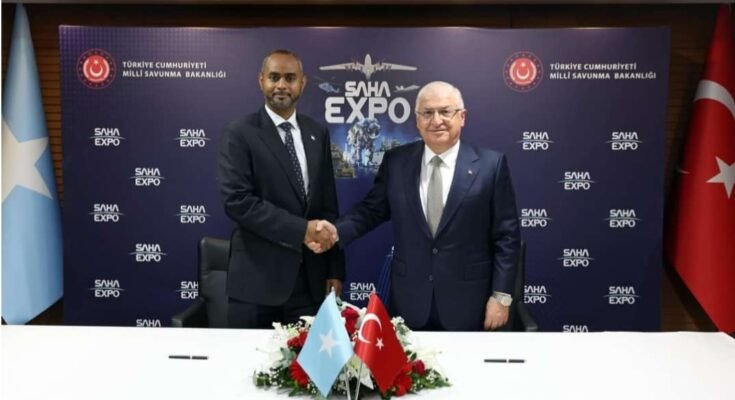“Somalia and Turkey today signed a new defense agreement.”
Introduction
On a significant day in international relations, Somalia and Turkey have solidified their partnership by signing a new defense agreement. This agreement marks a crucial step in enhancing bilateral ties, particularly in the realms of security and military cooperation. As Somalia continues to navigate its complex security landscape, Turkey’s involvement represents a strategic alliance that could influence stability in the Horn of Africa.
Historical Contex
To understand the significance of the new defense agreement, it is essential to delve into the historical context of Somalia-Turkey relations. Turkey has played an increasingly prominent role in Somali affairs since the early 2010s, particularly during the humanitarian crisis exacerbated by drought and conflict. Turkey’s commitment to Somalia has been evident through substantial humanitarian aid and investment in infrastructure projects, further establishing a foundation for deeper political and military ties.
Extremism-the Growing Menace
Instability in Somalia has been something evident for many years now, occasioned by the fact that militant groups have taken the opportunity to engage in activities that quite harmfully hurt the most, through weak governance structures and economic challenges. The Somali National Army is responsible for countering these threats, but faces a number of problems in view of insufficient training, equipment, and resources. Given this situation, the added importance of the new defense agreement between Somalia and Turkey is the greater training and military support that is extended to the SNA.
Key Provisions of the Agreement
Though the entire defense agreement is yet to be made public, some of the major provisions it might carry can be speculated based on earlier collaborations. The agreement is likely to include:
Military Training: Military training by Turkey to Somali forces is not something new. This agreement may expand on these efforts, offering specialized training for counter-terrorism operations and improving overall effectiveness within the SNA.
Intelligence Sharing: The two countries’ increased intelligence cooperation would greatly enhance Somalia’s proactive strike capability against terrorist threats.
Equipment and Logistics Support: Military equipment and logistics support will be of utmost importance for military operations in Somalia. The Turkish defense industry has been rapidly developing, and its readiness to provide Somalia with the necessary military hardware will contribute to enhancing its operational capability.
Joint Military Exercises: These could be routine between the Turkish and Somali forces to achieve better interoperability and a quick response towards any imminent threat.
Regional Implications
The consequences of the defense agreement between Somalia and Turkey will not remain confined within their borders but spill over into a wider regional dimension as well. The Horn of Africa is a region very important strategically, as the interests of several global powers intersect within it. The rise of Turkish influence in Somalia is likely to bring about a domino effect among the regional balances of power.
Countering Extremism: The agreement aspires to take on extremism more effectively by strengthening the defense capabilities of Somalia. A stable Somalia is crucial for regional security, especially in those cases where the spillover effects have effectively reached its borders.
Geopolitical Dynamics: This depth of Turkish engagement in Somalia is bound to stir a backlash from other regional players invested similarly in the security dynamics of the Horn of Africa, such as the United Arab Emirates and Ethiopia. The result could be alliance realignments and heightened jockeying for influence.
Strategic Interests of Turkey
Therefore, Turkish involvement in Somalia is not an act of pure charity; rather, it is one of its various steps in line with its greater strategic interests in the region.
Economic Ties: Somalia gives Turkey the perfect opportunity to cement its foothold in East Africa. The defense pact may prove a gateway to higher Turkish investments across various sectors, including construction, telecommunications, and agriculture.
Soft Power: Equally, Turkey has been involved in soft power development through cultural diplomacy and humanitarian projects in Somalia. This would, to a large extent, create a concrete argument for the establishment of military relationships that make Turkey a key ally in the region.
Energy Security: The Horn of Africa is also taking center stage in energy resources. A secure energy route and partnership might push further interest by Turkey to be involved in Somalia.
Challenges Ahead
Of course, there are promising features in this defense agreement, yet several challenges lie ahead that must be dealt with if success is to be achieved.
Corruption and Governance Issues: Somalia has struggled for quite a long time with corruption and weak governance. These issues, if not given adequate attention, might seriously undermine the effective impact of military assistance and training.
The Capacity Building of the SNA is required not only for military training but also needs reforms in its operational and accountability aspects. Military aid, alone and without this holistic approach, can achieve less.
Long-term Commitment: Stability in Somalia will be achieved when both Turkish and Somali parties are committed to a long-term process. The deal should not be considered as a one-time act but rather the start of a long-term partnership.

